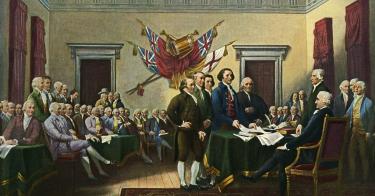The peculiar odyssey of the New York Times' "1619 Project" has gotten more peculiar still.
Just over a year ago, in a 100-page special edition, the New York Times Magazine rolled out the "Project," announcing that it "aims to reframe the country's history" by replacing 1776—you know, the American Revolution, the Declaration of Independence, and "all men are created equal"—with the year 1619 "as our true founding."
In case the year 1619 did not automatically ring liberty bells in people's minds, the project's director, Nikole Hannah-Jones, explained that 1619 was the year that 20 Africans were deposited by an English ship at the English colony of Virginia and sold into slavery. And that, argued New York Times Magazine editor Jake Silverstein, was the real founding of America, because "no aspect of the country that would be formed here has been untouched by the years of slavery that followed."
The journalists asserted that slavery and "the anti-black racism it required" shaped "nearly everything" in American life, from its economy to its slang to "the endemic racial fears and hatreds that continue to plague it to this day."
The response was incredulity. Two groups of American historians, one headed by myself and another by my Princeton colleague Sean Wilentz, wrote Silverstein noting a series of errors and overreach. For instance: Hannah-Jones's lead essay claimed that the American Revolution had been launched to defend slavery from British interference. Another Project essay, by sociologist Matthew Desmond, insisted that American capitalism was modeled on slave plantations, despite testimony from plantation owners about their loathing of capitalism as a threat to a slave economy.
The historians' protests were waved-away. But as the Times rolled forward with plans to repackage "The 1619 Project" as a history curriculum for K-12 schools, investigative journalists such as Cathy Young, John Murawski and Philip Magness began poking still more holes in the Project's claims.
One historian whom Hannah-Jones actually had consulted for the Project revealed that she had counseled against making the claim that the American Revolution had been designed to defend slavery, only to be shunted aside. This forced the New York Times issued a grudging "update" in March.
In May, according to inside sources, the Times pressed hard for the Pulitzer Prize Board to award the Project one of its annual prizes. But the board would only grant a Pulitzer to Hannah-Jones for her lead essay, and only for "commentary." Even that, wrote Peter Wood, the president of the National Association of Scholars, was little more than "a power play in which, at great expense in both money and reputation, The New York Times has attempted to intensify racial resentment and accelerate identity politics."
The cracks in the "Project's" facade have now widened sufficiently that the New York Times has begun quietly 'disappearing' some of its most outlandish assertions. As Philip Magness reported recently in Quillette, theTimes has noiselessly erased the "Project's" landing page claim about the year 1619 being "our true founding." It has also altered the text of the "Project's" introduction to eliminate the provocative claim that in 1619 "America was not yet America, but this was the moment it began."
Rather than touting how the "Project" "aims to reframe the country's history," Hannah-Jones is now protesting efforts by the federal government to "indoctrinate students" into what she criticized as a "patriotic" reading of history in the classroom.
Skepticism about "The 1619 Project" abounded from the first. Columbia University linguistics professor John McWhorter warned that the "Project" was really "an almost uncanny embodiment" of the "social justice warrior ideology"—the "Great Awokening," as Matthew Yglesias has called it—rather than a serious effort at historical revisioning. It licensed what McWhorter called "a fantastical way of thinking" about American history and the American founding.
The pity of this is that it's all-too-true that American history textbooks have, for over a century, sanitized, downplayed or even eliminated black America's claim to be American. In his study of 3,000 American history textbooks, Donald Yacovone discovered in 2018 that "The assumptions of white priority, white domination, and white importance underlie every chapter and every theme of the thousands of textbooks that blanketed the country."
But we will not rectify one set of historical errors by manufacturing another. In history, at least, two wrongs never make a right, and that is the lesson which it appears is only now slowly dawning on the New York Times and "The 1619 Project."
This piece originally appeared in ArcaMax



